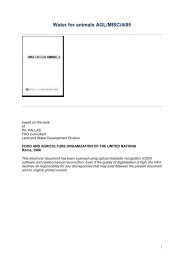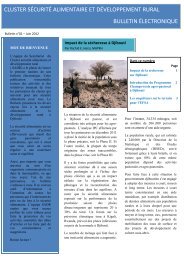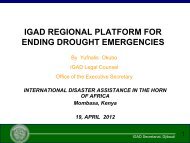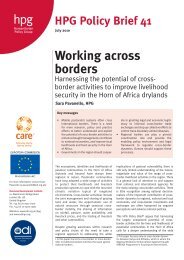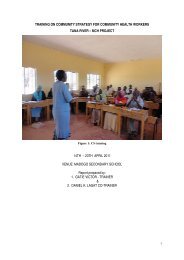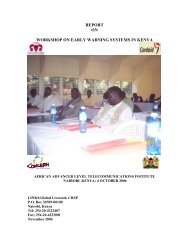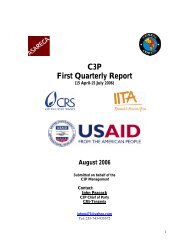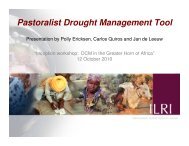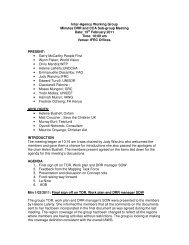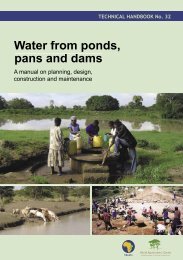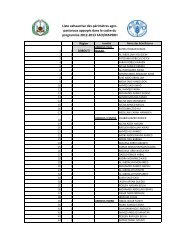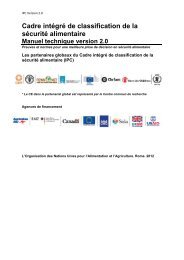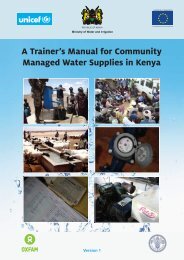Synthesis of Existing Knowledge and Experience on the Provision of ...
Synthesis of Existing Knowledge and Experience on the Provision of ...
Synthesis of Existing Knowledge and Experience on the Provision of ...
Create successful ePaper yourself
Turn your PDF publications into a flip-book with our unique Google optimized e-Paper software.
Many internati<strong>on</strong>al <str<strong>on</strong>g>and</str<strong>on</strong>g> local NGOs as well asinternati<strong>on</strong>al development organizati<strong>on</strong>s areengaged in water development in pastoralregi<strong>on</strong>s mainly in <strong>the</strong> c<strong>on</strong>structi<strong>on</strong> <str<strong>on</strong>g>and</str<strong>on</strong>g>rehabilitati<strong>on</strong> <str<strong>on</strong>g>of</str<strong>on</strong>g> water points, <strong>the</strong> development<str<strong>on</strong>g>of</str<strong>on</strong>g> small scale irrigati<strong>on</strong>, <str<strong>on</strong>g>and</str<strong>on</strong>g> <strong>the</strong> provisi<strong>on</strong> <str<strong>on</strong>g>of</str<strong>on</strong>g>capacity building <str<strong>on</strong>g>and</str<strong>on</strong>g> training.There is no uniform approach to <strong>the</strong> way thatNGOs or development organizati<strong>on</strong>s engage inpastoral areas. Individual organizati<strong>on</strong>s usuallywork in isolati<strong>on</strong> from government <str<strong>on</strong>g>and</str<strong>on</strong>g> from<strong>on</strong>e ano<strong>the</strong>r, meaning that just as forgovernment, NGO approaches run <strong>the</strong> gamutfrom c<strong>on</strong>venti<strong>on</strong>al technocratic methods tothose which are highly participatory <str<strong>on</strong>g>and</str<strong>on</strong>g>locati<strong>on</strong>-specific. As noted previously forgovernment interventi<strong>on</strong>s, incoherence inapproach to water development <str<strong>on</strong>g>and</str<strong>on</strong>g> weaklinkages between practiti<strong>on</strong>ers creates anenvir<strong>on</strong>ment where it is easy for inappropriate<str<strong>on</strong>g>and</str<strong>on</strong>g> poor quality water development to gounchecked.Box 11: Water User Associati<strong>on</strong>s in Ethiopia <str<strong>on</strong>g>and</str<strong>on</strong>g>relevance in <strong>the</strong> pastoral c<strong>on</strong>textIn <strong>the</strong> last 10 years, government <str<strong>on</strong>g>and</str<strong>on</strong>g> NGOs haveintroduced Water User Associati<strong>on</strong>s (WUA) as ameans for communities to take <strong>on</strong> <strong>the</strong> operati<strong>on</strong>,management, <str<strong>on</strong>g>and</str<strong>on</strong>g> maintenance <str<strong>on</strong>g>of</str<strong>on</strong>g> water points instead<str<strong>on</strong>g>of</str<strong>on</strong>g>, or <str<strong>on</strong>g>of</str<strong>on</strong>g>ten al<strong>on</strong>gside, government. These associati<strong>on</strong>sare generally made up <str<strong>on</strong>g>of</str<strong>on</strong>g> about 7 members meant torepresent a cross-secti<strong>on</strong> <str<strong>on</strong>g>of</str<strong>on</strong>g> water users in a givenlocality. Training is provided for <strong>the</strong>se members toenable <strong>the</strong>m to perform <strong>the</strong>ir duties, yet <str<strong>on</strong>g>of</str<strong>on</strong>g>ten, moreattenti<strong>on</strong> is given to physically establishing <strong>the</strong>seassociati<strong>on</strong>s ra<strong>the</strong>r than ensuring that <strong>the</strong>y operateeffectively. Projects are still more c<strong>on</strong>cerned withmeeting targets as outlined in proposals ra<strong>the</strong>r thanmeasuring effectiveness. WUAs <strong>the</strong>refore suffer fromweak management, operati<strong>on</strong>, <str<strong>on</strong>g>and</str<strong>on</strong>g> maintenancecapacity. Very <str<strong>on</strong>g>of</str<strong>on</strong>g>ten water points are managed bygovernment even though <strong>the</strong>y are meant to be h<str<strong>on</strong>g>and</str<strong>on</strong>g>edover to WUAs to manage. In <strong>the</strong> pastoral c<strong>on</strong>text,WUAs could benefit <str<strong>on</strong>g>and</str<strong>on</strong>g> learn from existing customarywater management systems, <str<strong>on</strong>g>and</str<strong>on</strong>g> avenues should beexplored to meld <strong>the</strong> two management arrangementsto make <strong>the</strong> most <str<strong>on</strong>g>of</str<strong>on</strong>g> what each has to <str<strong>on</strong>g>of</str<strong>on</strong>g>fer.In terms <str<strong>on</strong>g>of</str<strong>on</strong>g> engagement <strong>on</strong> <strong>the</strong> ground, <strong>the</strong>re are two ways in which NGOs/developmentorganizati<strong>on</strong>s engage with pastoralists. The first method is to approach <strong>the</strong> woreda <str<strong>on</strong>g>of</str<strong>on</strong>g>fice whichidentifies PAs or kebeles where <strong>the</strong>re is need for water. Once areas are identified, <strong>the</strong> PA authorityorganizes a community meeting where priorities are identified by a committee meant to represent<strong>the</strong> community. NGOs/development organizati<strong>on</strong>s <strong>the</strong>n plan interventi<strong>on</strong>s, submit proposals atregi<strong>on</strong>al level for approval, implement <strong>the</strong> project, <str<strong>on</strong>g>and</str<strong>on</strong>g> h<str<strong>on</strong>g>and</str<strong>on</strong>g> over new infrastructure to ei<strong>the</strong>r <strong>the</strong>administrative authority or to Water User Associati<strong>on</strong>s (WUAs). The sec<strong>on</strong>d method <str<strong>on</strong>g>of</str<strong>on</strong>g>engagement is for NGOs to approach communities directly who <strong>the</strong>mselves identify developmentpriorities without relying <strong>on</strong> local administrati<strong>on</strong> to facilitate <strong>the</strong> process. This is comm<strong>on</strong> am<strong>on</strong>gNGOs who have previous experience in an area or with a particular community, <str<strong>on</strong>g>and</str<strong>on</strong>g> avoidspotential administrative biases. Development needs are discussed directly with communities, localbaselines sometimes carried out, interventi<strong>on</strong>s planned, proposals submitted for approval at regi<strong>on</strong>allevel, <str<strong>on</strong>g>and</str<strong>on</strong>g> infrastructure h<str<strong>on</strong>g>and</str<strong>on</strong>g>ed over to local government or WUAs. Whe<strong>the</strong>r organizati<strong>on</strong>s engagewith communities directly or through <strong>the</strong> kebele, in both cases proposals must be submitted toei<strong>the</strong>r regi<strong>on</strong>al pastoral bureaus/commissi<strong>on</strong>s if <strong>the</strong> project is related to pastoral development or to<strong>the</strong> water bureau if <strong>the</strong> interventi<strong>on</strong> is purely water related. If projects in pastoral areas areimplemented by c<strong>on</strong>sortia, each organizati<strong>on</strong> must independently clear proposed activities with <strong>the</strong>relevant authority.Setting up WUAs is now increasingly encouraged to improve downward accountability by bothNGOs <str<strong>on</strong>g>and</str<strong>on</strong>g> government, <str<strong>on</strong>g>and</str<strong>on</strong>g> to enable communities to manage <str<strong>on</strong>g>and</str<strong>on</strong>g> operate local water points,ra<strong>the</strong>r than <strong>the</strong> resp<strong>on</strong>sibility lying solely with government or with customary instituti<strong>on</strong>s whichpreviously managed water resources. These Associati<strong>on</strong>s are meant to reflect a cross-secti<strong>on</strong> <str<strong>on</strong>g>of</str<strong>on</strong>g> <strong>the</strong>community (Box 11). To date, however, WUAs <str<strong>on</strong>g>of</str<strong>on</strong>g>ten lack <strong>the</strong> capacity to manage <str<strong>on</strong>g>and</str<strong>on</strong>g> operatecomplex schemes – unlike customary systems.61



